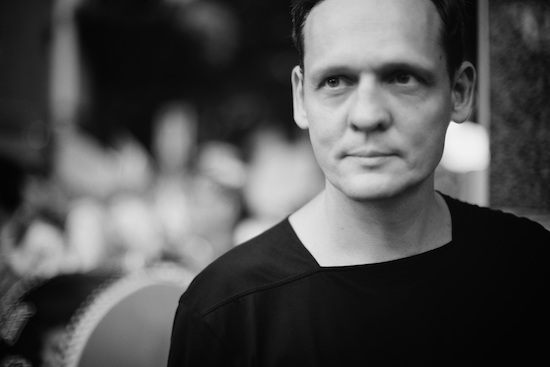There is far too much music to keep up with nowadays – too much to discover, too much to follow, and far too much to really hear. Carsten Nicolai, or Alva Noto, knows this all too well. To narrow down his selection for his Baker’s Dozen, he decides to return to the 80s, reminiscing about the music he listened to as a teenager in East Germany, before the wall came down. He first comes up with a list of 16 records, and after whittling it down to 13, still finds a way to work the other three into our conversation.
Alva Noto chooses to talk about records he’s listened to “at least 100 times” – back when he was listening as a fan, rather than a musician. In the GDR, records were relatively hard to come by, so listening to these records on repeat formed the “backbone” of his musical interests. Since then, it goes without saying that Alva Noto has gone on to become a formidable name in electronic music, and the traces of Afrika Bambaataa’s groove or Einstürzende Neubauten’s spirit in Noto’s later work are fascinating to hear. The Noton founder (formerly raster-noton, run by Nicolai, Olaf Bender aka Byetone and Frank Bretschneider) has also established himself as a visual artist, producer, composer and tireless collaborator of Ryuichi Sakamoto, Blixa Bargeld, and the late Mika Vainio, among others.
On the records he’s chosen in his final list, he says: “When I listen to these records now, I remember the exact period during which I was listening to them before. They stand for a certain period in my life; they’re icons for them, for certain kinds of thinking, what I was doing, or maybe even Pilsner stories. They really connect to your life.”
As we chat about listening, Nicolai says the loss of independence afflicting many Spotify and Soundcloud users today is risky; “It’s a simple fact that now you always need to be online, but what happens when you don’t have internet? You have no music. For me, that’s not acceptable.”
Live 2002 (Mika Vainio + Ryoji Ikeda + Alva Noto) is out now on Noton. Alva Noto & Ryuichi Sakamoto’s Glass is also out now. Alva Noto plays the Barbican on 4th March and his album UNIEQAV is out 16th March. Click the image below to begin looking through the selections


